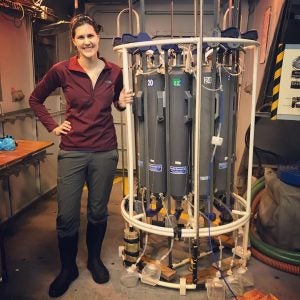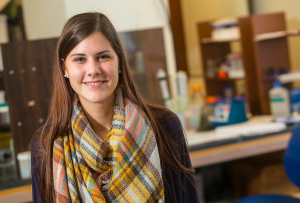May 15, 2020
Welcome to the third in our new series: GSO Profiles! Each post will feature a brief interview with a member of the GSO community. Our first several profiles will be of GSO students who either graduated this past December or will this month. These profiles are one way we can celebrate the accomplishments of those graduating in this unusual time of COVID-19, and also welcome them to the ranks of GSO alumni.
We are continuing our series with Victoria M. Fulfer, who finished her M.S.in Oceanography in December with GSO Professor Steven D’Hondt. The focus of their lab is on the subseafloor biosphere. Victoria, who hails from Carlisle, Pa., was at URI for her undergraduate work and received her B.S. in Cell and Molecular Biology in 2016. You can still find her around campus, because she is staying on for her Ph.D. with GSO Professor Susanne Menden-Deuer.
Here’s Victoria, in her own words:

GSOP: Tell us about your work/research at GSO: what question(s) are you trying to answer?
VMF: My work focused around understanding chemical cycling in subseafloor sediment. Microbes in the subseafloor sediment grow incredibly slowly, at rates slower than anywhere else on Earth. These microbes use chemical compounds in the sediment for energy, and I was interested in the rates of energy generation and consumption. My thesis involved creating global models of respiration for the entire subseafloor sediment. It was a challenging process, but the final product was really rewarding.
GSOP: What is your favorite thing about your work?
VMF: Trying to answer questions about how life can be sustained deep beneath the sediment at the bottom of the ocean was really motivating. This type of research could one day be used to predict life on other planets. But my favorite thing about oceanographic work is definitely going to sea to collect samples. It’s part of the job that is unique to oceanography, and really feels like a once-in-a-lifetime experience every time.
GSOP: What led you to your studies/career in ocean science?
VMF: When I was an undergraduate student studying molecular biology, I applied for a summer job at GSO. I knew nothing about oceanography but started working with GSO Marine Research Scientist Rob Pockalny and GSO Professor Steven D’Hondt. I still wasn’t completely sold on oceanography as a career until I went on a research cruise as an undergraduate with GSO Professor Susanne Menden-Deuer. That experience completely changed my life, really! I fell in love with oceanographic research and switched my career focus from medicine to oceanography.
GSOP: What brought you to GSO?
VMF: I had worked at GSO as an undergraduate student, and though I applied to other oceanography graduate schools, none of them felt like the right fit. GSO has an amazing community, and I decided that was really important to me when choosing a school. I was excited to pursue more projects with Steven D’Hondt, who accepted me into his lab as a graduate student. I love it here at GSO, so much that I am staying to earn my Ph.D.
GSOP: How have the COVID precautions affected you?
VMF: I was set to embark on the NASA EXPORTS cruise, a six-week mission in the North Atlantic. It was cancelled about a month before we were set to sail, and that was incredibly disappointing. I have had to rework my plans for my Ph.D. research to accommodate the potential of limited cruises in the near future. But working from home has given me time to focus on milestones such as studying for comprehensive exams and working on my dissertation proposal, and also gives me a chance to develop habits for a good work-life balance that I hope to continue when COVID restrictions have lifted.
GSOP: Who have been your role models or mentors?
VMF: There are so many amazing people who have gotten me where I am today. Pockalny and D’Hondt introduced me to oceanographic research and have both contributed greatly to my career. GSO Professor and Associate Dean for Academic Affairs David Smith has been a mentor to me since I was an undergraduate student and continues to be an invaluable resource for all parts of graduate school and life. Professors at GSO such as Rebecca Robinson and Susanne Menden-Deuer have provided really formative advice and are wonderful role models as women in STEM. Victoria Orphan, Professor of Environmental Science and Geobiolgy at the California Institute of Technology, who I had the pleasure of working with my first summer of graduate school, is one of my greatest role models in science, showing me you could be very successful as a woman in science even if you are not incredibly extroverted. And of course, my parents, who taught me to work hard and be selfless and who are always so supportive.
GSOP: What do you do for fun?
VMF: I enjoy hiking, camping, and rock climbing. Rhode Island is great for being out on the water, so I do a lot of kayaking and paddle boarding in the summer. During the winter months, exploring Rhode Island’s always-expanding brewery scene is a favorite past time for me and my friends.
GSOP: What is your favorite spot or view at GSO?
VMF: The view from the upper deck of the R/V Endeavor during sunrise or sunset on research cruises is my absolute favorite. Here on campus, I would say the view from the Pell Marine Science Library. It overlooks the quad and most of campus, with a great view of the Endeavor and Narragansett Bay.

GSOP: What is your advice for someone considering ocean science for their academic/professional career?
VMF: I would say to find good mentors at all stages and be willing to adjust your research interests throughout your career. There is so much out there about the ocean that we don’t know, and it makes this an incredibly rewarding and dynamic area of research.
